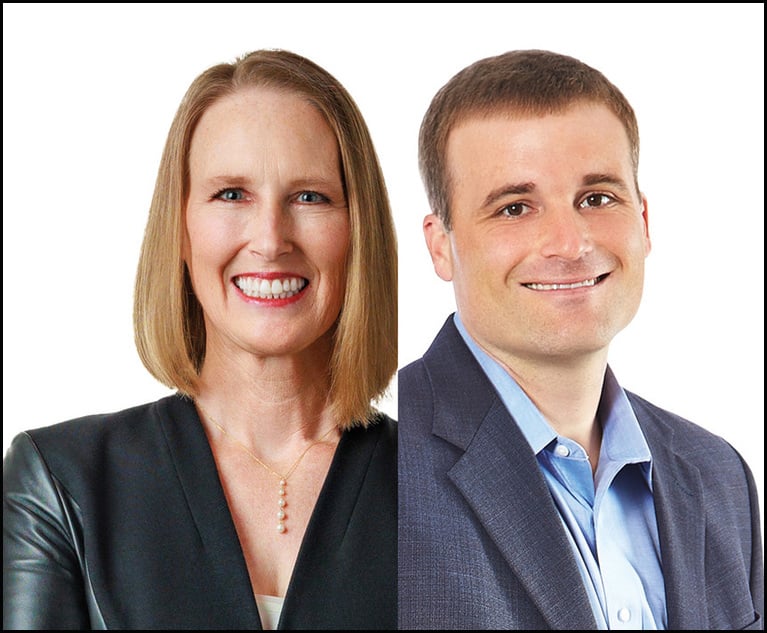Farella Bolsters Land Use Practice With Former SF Supervisor Tang
San Francisco Supervisor Katy Tang has left City Hall to join the land use and real estate department at Farella Braun + Martel.
January 10, 2019 at 05:31 PM
4 minute read
 Katy Tang of Farella Braun + Martel.
Katy Tang of Farella Braun + Martel.
As San Francisco Supervisor Katy Tang leaves the government sector to join Farella Braun + Martel as a land use specialist, she said she hopes to make a greater impact by uniting “policy and realities on the ground.”
Tang has joined the San Francisco-based law firm's real estate and land use department following her transition from the San Francisco Board of Supervisors, where she has represented the Sunset and Parkside neighborhoods for the past six years. Tang also served as chair of the land use and transportation committee.
Tang was appointed to San Francisco's board of supervisors in 2013 by the late Mayor Ed Lee. During her tenure, Tang was an advocate for middle-income families, small businesses and protecting the environment. She created the city's local density bonus programs, including “HOME-SF,” which provides incentives to developers to build low- and middle-income housing. And she sponsored legislation to streamline in-law unit permitting, among other initiatives.
The Recorder caught up with Tang to talk about her move to Farella Braun + Martel, and her new real estate and land use practice.
Why did you decide to go into private practice?
I started working at City Hall pretty soon after graduating from college in 2006 and never left. As I approached my 12th year working in local government, I felt it was time to gain private sector experience and to better understand what happens outside of City Hall.
Among all the firms in the Bay Area, why did you pick Farella Braun + Martel?
At the Board of Supervisors, we spend a lot of time immersed in land use matters. As such, I was exposed to Farella Braun + Martel, and in particular Steven Vettel's work, for many years. I have always found both the firm and Steven to be of the highest integrity and caliber. My hope is to learn as much as I can from the firm and to also offer my insights coming from the policy and political world.
What land use issues are unique to the Bay Area?
The Bay Area has been and will continue to be an attractive place for people to live and work. However, the areas with job growth have not always matched the areas of housing growth in the region. In San Francisco in particular, we have much less land compared to most other jurisdictions in the Bay Area. So not only do we have our own citywide challenges in terms of a housing/jobs imbalance, but we also face a problem regionally given that many other jurisdictions are not as interested in housing growth.
What was the most valuable lesson you learned from your experience on the San Francisco Board of Supervisors?
I have learned so much while serving on the San Francisco Board of Supervisors, and it's hard to pinpoint the most valuable lesson learned. But I would say that doing your homework and keeping an open line of communication with everyone, no matter how adverse they are to you, are critical to moving things forward.
How do you plan on transferring the skills you have honed in government service to private practice?
So many issues get wrapped up into land use matters—they can involve policy desires of critical decision-makers, needs of the surrounding community of a proposed project, personalities of parties involved and so much more. While serving on the Board of Supervisors, I have had to work through all of these issues and hope to bring my perspectives given this experience.
Were you or are you now in a position to have an impact on the city's housing crisis?
While serving on the Board, I had a huge role to play when it came to the City's housing crisis—but that was from a policy perspective. Moving into the private sector, I still hope to make an impact by bridging both policy and realities on the ground.
This content has been archived. It is available through our partners, LexisNexis® and Bloomberg Law.
To view this content, please continue to their sites.
Not a Lexis Subscriber?
Subscribe Now
Not a Bloomberg Law Subscriber?
Subscribe Now
NOT FOR REPRINT
© 2025 ALM Global, LLC, All Rights Reserved. Request academic re-use from www.copyright.com. All other uses, submit a request to [email protected]. For more information visit Asset & Logo Licensing.
You Might Like
View All


TikTok Hit With California Class Action for Allegedly Mining Children's Data Without Parental Consent

Khan Defends FTC Tenure, Does Not Address Post-Inauguration Plans
Trending Stories
- 1The FTC’s Noncompete Rule Is Likely Dead
- 2COVID-19 Vaccine Suit Against United Airlines Hangs on Right-to-Sue Letter Date
- 3People in the News—Jan. 10, 2025—Lamb McErlane, Saxton & Stump
- 4How I Made Partner: 'Be Open With Partners About Your Strengths,' Says Ha Jin Lee of Sullivan & Cromwell
- 5Essential Labor Shifts: Navigating Noncompetes, Workplace Politics and the AI Revolution
Who Got The Work
Michael G. Bongiorno, Andrew Scott Dulberg and Elizabeth E. Driscoll from Wilmer Cutler Pickering Hale and Dorr have stepped in to represent Symbotic Inc., an A.I.-enabled technology platform that focuses on increasing supply chain efficiency, and other defendants in a pending shareholder derivative lawsuit. The case, filed Oct. 2 in Massachusetts District Court by the Brown Law Firm on behalf of Stephen Austen, accuses certain officers and directors of misleading investors in regard to Symbotic's potential for margin growth by failing to disclose that the company was not equipped to timely deploy its systems or manage expenses through project delays. The case, assigned to U.S. District Judge Nathaniel M. Gorton, is 1:24-cv-12522, Austen v. Cohen et al.
Who Got The Work
Edmund Polubinski and Marie Killmond of Davis Polk & Wardwell have entered appearances for data platform software development company MongoDB and other defendants in a pending shareholder derivative lawsuit. The action, filed Oct. 7 in New York Southern District Court by the Brown Law Firm, accuses the company's directors and/or officers of falsely expressing confidence in the company’s restructuring of its sales incentive plan and downplaying the severity of decreases in its upfront commitments. The case is 1:24-cv-07594, Roy v. Ittycheria et al.
Who Got The Work
Amy O. Bruchs and Kurt F. Ellison of Michael Best & Friedrich have entered appearances for Epic Systems Corp. in a pending employment discrimination lawsuit. The suit was filed Sept. 7 in Wisconsin Western District Court by Levine Eisberner LLC and Siri & Glimstad on behalf of a project manager who claims that he was wrongfully terminated after applying for a religious exemption to the defendant's COVID-19 vaccine mandate. The case, assigned to U.S. Magistrate Judge Anita Marie Boor, is 3:24-cv-00630, Secker, Nathan v. Epic Systems Corporation.
Who Got The Work
David X. Sullivan, Thomas J. Finn and Gregory A. Hall from McCarter & English have entered appearances for Sunrun Installation Services in a pending civil rights lawsuit. The complaint was filed Sept. 4 in Connecticut District Court by attorney Robert M. Berke on behalf of former employee George Edward Steins, who was arrested and charged with employing an unregistered home improvement salesperson. The complaint alleges that had Sunrun informed the Connecticut Department of Consumer Protection that the plaintiff's employment had ended in 2017 and that he no longer held Sunrun's home improvement contractor license, he would not have been hit with charges, which were dismissed in May 2024. The case, assigned to U.S. District Judge Jeffrey A. Meyer, is 3:24-cv-01423, Steins v. Sunrun, Inc. et al.
Who Got The Work
Greenberg Traurig shareholder Joshua L. Raskin has entered an appearance for boohoo.com UK Ltd. in a pending patent infringement lawsuit. The suit, filed Sept. 3 in Texas Eastern District Court by Rozier Hardt McDonough on behalf of Alto Dynamics, asserts five patents related to an online shopping platform. The case, assigned to U.S. District Judge Rodney Gilstrap, is 2:24-cv-00719, Alto Dynamics, LLC v. boohoo.com UK Limited.
Featured Firms
Law Offices of Gary Martin Hays & Associates, P.C.
(470) 294-1674
Law Offices of Mark E. Salomone
(857) 444-6468
Smith & Hassler
(713) 739-1250






